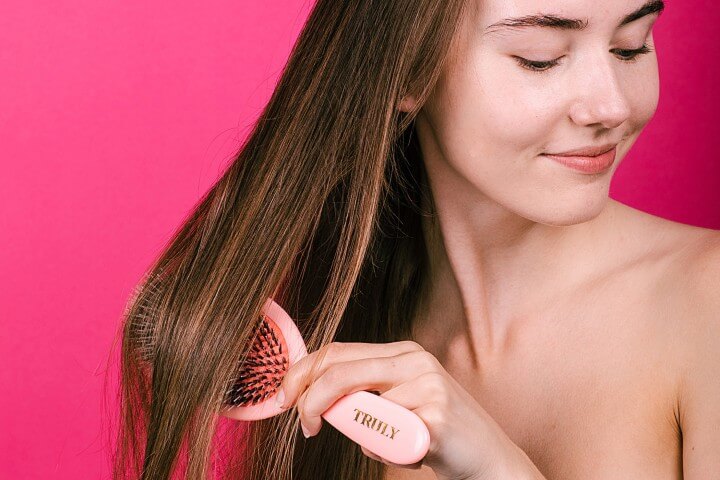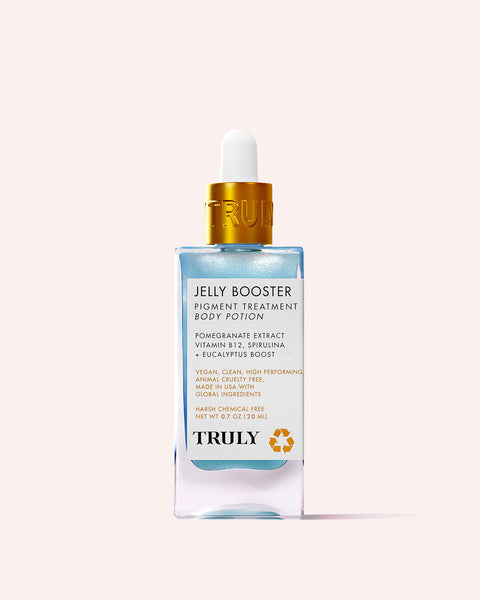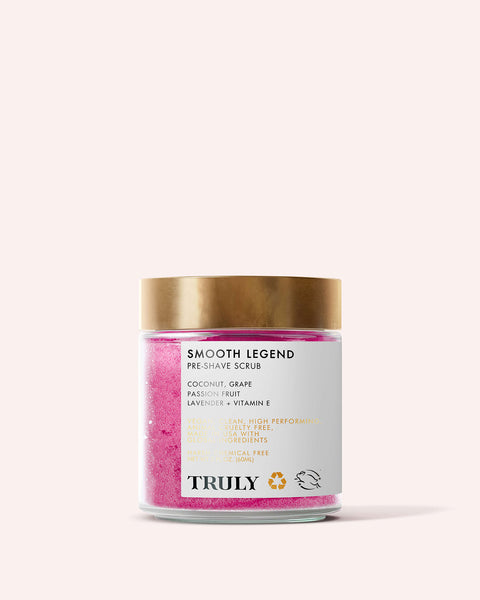Limp, Lifeless Hair? Try Scalp Exfoliation

Meh hair? It's time to smarten up about your scalp!
It turns out, you might be neglecting a crucial step in your haircare routine -- scalp exfoliation.
If you're looking to add volume, shine, and va va voom to your mane, the pros recommend exfoliating your scalp on a regular basis. Allegedly, it's supposed to remove product buildup, slough off dead skin cells and excess oil, and ultimately promote thicker, fuller hair. Sound good?
That's what we thought!
Below, we give you the lowdown on how to exfoliate your scalp, the benefits of doing it, and how exactly to get started.
SCALP EXFOLIATION, EXPLAINED
Exfoliation is a prominent step in skincare -- just like it should be in haircare!
Its purpose? To speed up the natural process of removing dead skin cells from the skin to reveal never, smoother cells underneath. It can be achieved through the use of either physical exfoliants (i.e. sugar or salt-based scrubs) or chemical exfoliants (i.e. products containing acids like glycolic acid or lactic acid).
Unfortunately, scalp scrubs aren't that commonplace at the moment. But they really should be...
They can treat everything from dandruff to dullness, oily scalp to dryness. More on that now!
WHY YOU SHOULD EXFOLIATE YOUR SCALP
Here are just a few benefits of scrubbing your scalp clean.
It Soothes Scalp Inflammation
Itchy, flaky, burning scalp? You could be dealing with scalp inflammation.
See, your scalp collects a variety of debris ranging from dirt to dead skin cells, natural oils to hair products. Over time, all that debris becomes trapped and leads to buildup.
"When you have product, dirt, and oil building up around your follicle opening—which is where your hair grows out of—buildup around that starts to slowly suffocate your hair root, and it causes inflammation," explains trained trichologist and hairstylist Shab Reslan.
By clarifying your scalp with a gentle scrub, you remove all that buildup and regain your healthy scalp once more.
It Treats and Prevents Dandruff
Flaky scalp? Oily scalp? Dry scalp?
That's probably because of excess sebum lurking on your scalp. In the right amount, sebum promotes nourished, healthy hair. An overproduction of it, on the other hand, can feed the malassezia furfur yeast that leads to dandruff and overall dryness.
Occasional exfoliating can help manage the flakes and prevent dandruff flare-ups.
It Promotes Thick & Voluminous Hair
If you've got a buildup of dandruff and sebum on your scalp, that's only going to clog your hair follicles. Anyone know what that leads to? Hair loss and thinning.
"In most cases, the follicle has two or more hairs growing from it," says David Adams, cofounder and colorist of FourteenJay salon. "When it’s clogged, the follicle shrinks and therefore the number of hairs growing from it are reduced."
Scrubbing and purifying the scalp can clear these blockages, which will help hair grow thicker and appear fuller.
Scalp exfoliation can also enhance blood circulation to the hair follicles, providing essential nutrients to rejuvenate the scalp and promote healthy hair growth.
This scalp treatment is an excellent option for people with fine hair seeking a little oomph boost!
It Gives Your Strands Shine
If you're dealing with dull hair, you could be experiencing a buildup of styling products on your scalp. It could be dry shampoo, gel, hairspray, or volume sprays -- whatever it is, it's time to detox your scalp!
You might be wondering why shampooing isn't enough? After all, isn't shampoo the hair product for cleansing the scalp of impurities? True, but exfoliation offers just a bit more cleansing power.
Unlike shampooing which only gets at the surface of the dirt, exfoliation digs a little deeper for more thorough cleansing and improved scalp health.
By removing that buildup, your strands have better chance to shine.
HOW TO EXFOLIATE YOUR SCALP
- Brush Your Scalp
Start by buffing your scalp with a boar bristle brush like Truly's For Luscious Locks Hair Brush. This loosens the debris on the scalp, making the process of exfoliation a little easier.
Use gentle strokes, and avoid brushing too hard to prevent causing scalp irritation.
- Wash with a ClarifyingShampoo
To exfoliate the scalp, you want to start with a clean-ish scalp. That means shampooing it beforehand to remove any oil, dirt, grime, or product.
Using Truly's Super Flower Shampoo, work the product into a lather and massage it into your scalp, rinsing with lukewarm water. This keratin-activating shampoo purifies the scalp while delivering hydration, offering relief for itchy scalps. It also tackles oily hair, frizz, and dry hair -- this baby works for all hair types.
- Scrub with a Physical Exfoliator
Scalp scrubs are amazing at removing scalp-clogging debris and product without being too abrasive. These kinds of scrubs typically use granular particular like sea salt or sugar blended with oils like coconut oil, tea tree oil, or jojoba oil to manually get rid of dirt and oil on the scalp.
Simply massage the scrub into your scalp, applying light pressure at all times.
- Hydratethe Scalp
After every scalp exfoliating session, be sure to follow up with a moisturizing product.
You can do this with a conditioner like Truly's Super Flower Conditioner in the shower or post-wash with a hair mask like Truly's Unicorn Hair Repair Mask. Doing this will also help alleviate itchiness and make the hair look smoother, softer, and shinier.
Massage a small amount into your scalp, moving in circular motions as if performing a DIY head massage. If you're using conditioner, leave it on for five minutes before rinsing. If you're using a mask, you can either leave it in or wash it off after 20 minutes.
Scalp exfoliation is a hair treatment that's becoming more and more common in the modern world. With a growing number of people seeking natural hair growth and thickening solutions, it was only a matter of time before the world discovered the secret of scalp exfoliation and its many, many benefits. So jump on the scalp scrub bandwagon and give it a try!








